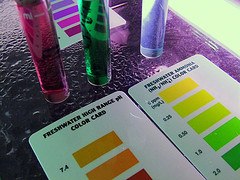 When homeowners begin to learn about the issues that plague our nation’s tap water, one of the first questions that they have is, “How is water quality monitored?” Today we’re going to talk about the limitations of how water quality is monitored in North and South Carolina and the best alternative for testing the water in your home!
When homeowners begin to learn about the issues that plague our nation’s tap water, one of the first questions that they have is, “How is water quality monitored?” Today we’re going to talk about the limitations of how water quality is monitored in North and South Carolina and the best alternative for testing the water in your home!
Who monitors water quality in the Carolinas?
The Safe Drinking Water Act of 1974 requires the EPA to set standards for water quality across the country. Along with setting maximum contaminant levels for close to 100 different contaminants, the EPA has established a set of standards for how water quality should be tested and monitored by public water systems.
In states that have established standards that are at least as strict as those set out by the EPA, the primary enforcement of water quality can be transferred to the state. This is true for both North and South Carolina.
It’s important to note that federal and state regulations only apply to public water systems. For private wells, monitoring and treating water is the responsibility of the owner(s) of the well.
How is water quality monitored?
At various times throughout the year, public water systems send samples of their water to certified laboratories for testing. The frequency at which these samples are submitted depends on the type of contaminant that is being tested for, as well as the standards set by each individual water system.
The results of these tests are submitted to and maintained by the state. Every year by July 1st, public water systems send Consumer Confidence Reports to all of their customers with the average contaminant levels for each regulated contaminant for that year.
What are the limitations of how water quality is monitored?
One of the biggest limitations for how water quality is monitored is the small amount of contaminants that are actually regulated. Although there are close to 100 regulated contaminants, there are many other common contaminants that are not regulated (some of which have been linked to serious health effects and others that we don’t quite know the effects of yet).
In addition, water contamination often occurs after water is tested by water treatment systems as it travels to your home. Contamination can occur both in the pipes used by public water delivery systems (many of which are more than 100 years old) as well as in the pipes in your own home.
In order to get a better idea of what’s in your water, it’s best to have your home’s water tested by a professional water quality analyst. NC Water Consultants offers free water quality testing that provides a detailed report of what’s in your water, which can be used to pick the best treatment solution for your home.
If you have any questions about how water quality is monitored, or if you’d like a water treatment system serviced or installed in your home, contact North Carolina Water Consultants. We’re you’re North and South Carolina water treatment company, servicing towns like Oakboro, Charlotte and Davidson, NC.
photo credit: cybergibbons via photopin cc
